There are some advantages to being a medieval peasant. For example, Twitter hasn’t been invented yet, so your exposure to the world’s worst opinions is quite limited. But on balance there are many more disadvantages. Healthcare is a bit iffy. You have no central heating. Heavy labor is the norm. And if you live in my Manor Lords village, you’re probably getting really bored eating eggs and stepping over dead bodies.
Manor Lords is a medieval city builder that I’ve had my eye on for a while, and with the early access launch on the horizon, I’ve put on a nice mantle and started leading my people to prosperity. There have been some bumps in the road.
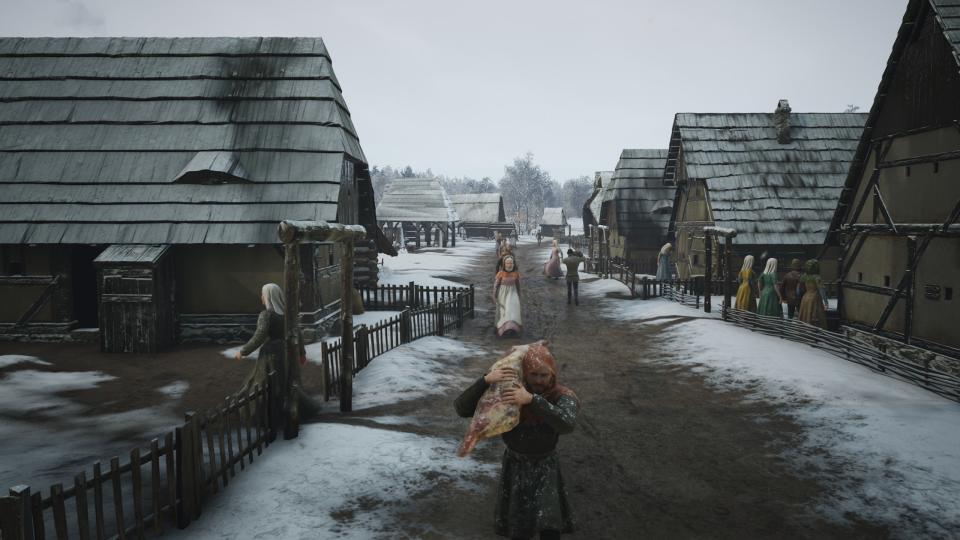

Although the city builder boom has seen many developers create some dramatic twists in the genre: building a society on the back of a massive creature in The Wandering Village, or letting villages grow organically in Foundation—Manor Lords initially feels a bit more conventional. You start with a camp and a few homeless settlers on a heavily forested map, and from there you tear down roads and buildings, from houses to sawmills, as you try to expand while keeping your villagers both alive and happy.
As you upgrade your homes, more and more demands are placed on you. Once content with water, food and clothing, your villagers now expect a more varied diet and piss-ups in the tavern. Bread, fruit And beer? I know, it’s ridiculous. So you put up more buildings, but that requires even more villagers, who then need to be housed and fed, which means you have to build more farms and more logging camps, which require even more villagers, and the cycle continues.
Within these conventions, however, Manor Lords does some very interesting things, like how a house isn’t just a simple dwelling. See, while most buildings are placed individually, houses require you to bring up a box where the size determines how many buildings will appear. The wider the box, the more homes. The height of the box, meanwhile, determines how much space each family has to develop their property.
Working from home
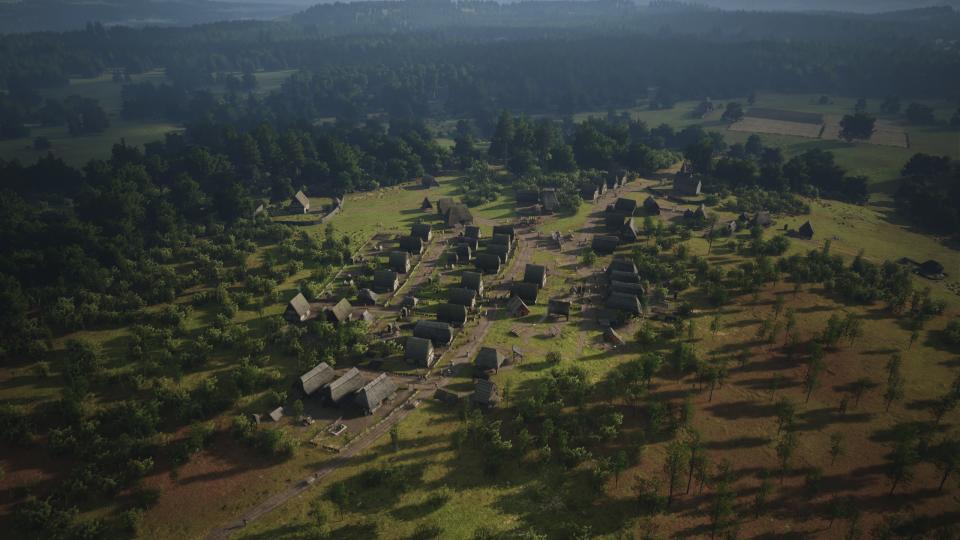

Once a house is built, you can go to the build menu and give it more usability. This way, your villagers can grow carrots in their gardens, plant apple orchards, or raise chickens, which will take some of the load off your food production and make winters (when foraging and farming are impossible) a lot less deadly. The larger the plot, the more fruit trees, allotments and chicken coops they can cram into it. Villagers will also work in their gardens when they are not busy in other buildings, so this does not remove a family from the labor market.
You can’t expect someone to make twenty spears and then do a job in the field.
The higher a home, the more use you can give it. At the second level you can turn houses into businesses and create blacksmiths to arm your militia or brewers to supply your tavern. However, doing this creates families of craftsmen, meaning they cannot work in other buildings. You can’t expect someone to make twenty spears and then do a job in the field. Well, as a tyrannical medieval nobleman you can probably expect that, but you really shouldn’t.
Anyway, this is why everyone in my village eats too many eggs. Look, food production is tough. A small village is easy to maintain, but at a certain point you can no longer maintain a surplus for the winter just by hunting and gathering. That’s when you should start thinking about farming, but it’s labor-intensive and time-consuming. Workers must till the soil, plant seeds, wait for them to grow and then harvest them. This takes months. Then they must turn the wheat into grain and deliver it to the mill, where another group of workers turn it into flour and put it in storage. Ultimately, the bakers will make bread from that flour and sell it on the market.
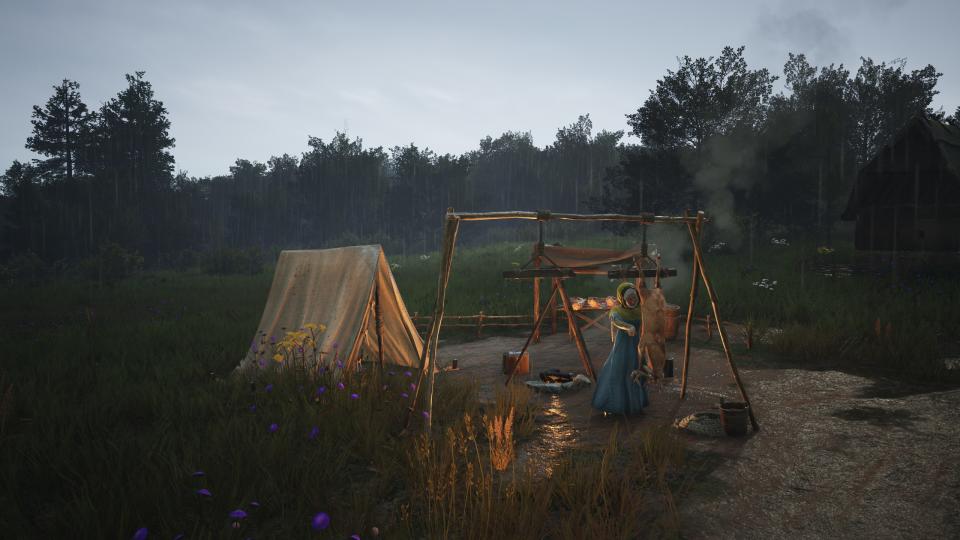

The bread making process can remove up to 14 families from the labor pool, requiring some micromanagement later in the year when they have nothing to do and so need to be placed in new roles. I just decided to fill everyone’s garden with chickens instead. This may be an age of feudalism, but my villagers are a bunch of community-minded proto-communists. They control the means of production and then share them by taking what they harvest to the village warehouse, where it can be distributed in the market for all to enjoy. Eggs for everyone!
Now I like an egg. On some toast. In a bowl of ramen. Made entirely of chocolate. Eggs are great. If I only ate eggs, they might make me a little sick. My villagers felt the same. With only a small amount of non-egg products hitting the market, my villagers started grumbling and my rating plummeted. It also became harder to attract new households, and with less food variety I couldn’t upgrade my existing homes. My egg strategy – initially so seductive and seemingly progressive – turned out to be devastating to the community. Progress stopped and I looked like a real old idiot.
Death and taxes
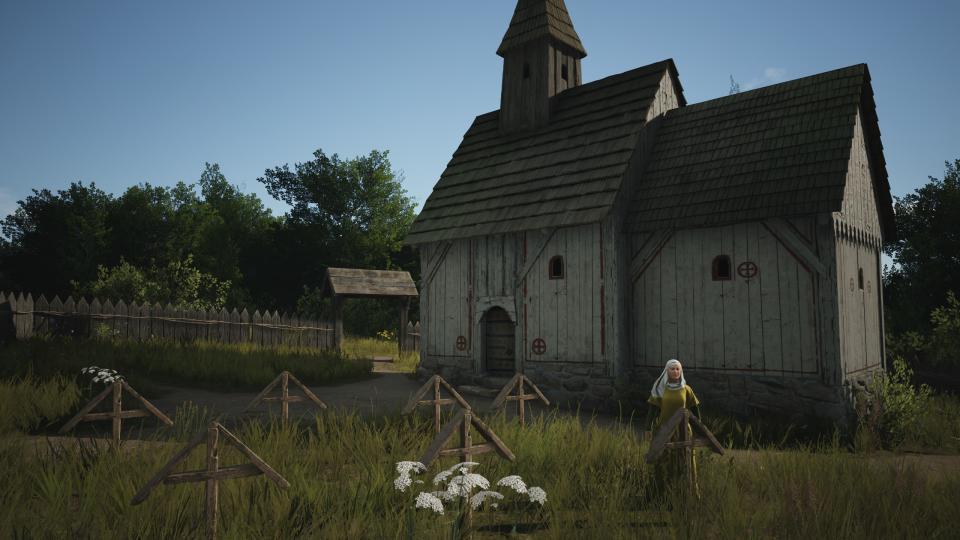

It certainly didn’t help that the village was dealing with a body problem. In the standard early access scenario, you’re encouraged to play at your own pace, as your one rival lord will leave you alone for the most part. You’ll see their armies marching around and you might get a little miffed as they gobble up territory near you, but until you’re ready, you never have to confront them. Bandits, however, are a different matter. At first the presence of their camps only drains resources thanks to their sticky fingers, but eventually they will start attacking your village.
The good news is that bandits are actually really bad at fighting, and right out of the gate you’ll have enough weapons to form a small militia. Once you have some iron, wood, and craftsmen, you can make many more, or you can just create a trade route and buy what you need. With two or three units with 20-30 troops you can easily defend one village. However, fighting is still a risk. When members of the militia die, it unsurprisingly means they can’t work, so you’re stuck with a family that won’t get to work until they can replace their deceased loved one. However, I have not yet been affected by too many villager deaths; the problem I’m facing actually stems from the effectiveness of my little warriors.
It turns out that corpses don’t just disappear as soon as they hit the ground. Who could have known? When a villager dies, he is buried in the cemetery, but bandits do not deserve this honor. They are thrown into a corpse pit. A corpse pit that I finally thought about building, but forgot to activate it by hiring a villager. Now I don’t know if you’ve ever had to wade through rotting carcasses on the way to the pub or on the way to work, but judging by the reaction of my villagers, it’s not a very pleasant experience. They still find it much more egregious to pay taxes, granted, but dead bodies were high on their list of things they hated about living in my village.
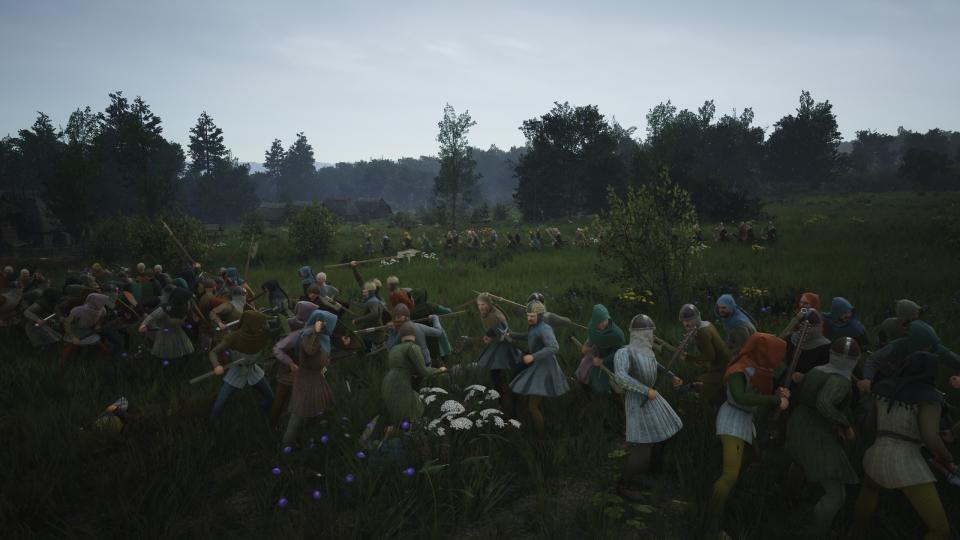

With some city builders these problems could have spelled the doom of my village, but Manor Lords is not a ruthless survival city builder. Winters can be harsh, deaths can cause setbacks, and you can’t thrive on eggs alone, but otherwise it’s pretty forgiving. A little action can usually solve most problems. For example, if you also invest too much in eggs, it’s easy enough to export whatever you have left and then import some food. By spending some money you can also create good trade routes to ensure a more regular supply.
Winters can be harsh, deaths can cause setbacks, and you can’t thrive on eggs alone, but otherwise it’s pretty forgiving.
You can also create an internal trade network by claiming other regions and developing more villages. That is indeed essential. Each region has the basic amenities you need, but that won’t be enough in the long run, necessitating the development of a settlement further away. The reason for my first expansion was drinking. There was no place in my starting region suitable for growing barley, so I had to use my influence to claim one nearby. Now my farmers are all drunk and hate me less – hurrah!
While all this talk of death, taxes, and eggs may paint a bleak picture, Manor Lords is an infectious city builder that lets you admire what you’ve built. I’ve spent a significant amount of time walking around there as a noble, and even outside of that mode you can seamlessly go from viewing a map of each region to street level. If you’re like me and hopelessly obsessed with taking screenshots, you’ll probably also appreciate the ability to remove the HUD by pressing CTRL+C. A lot of work has clearly gone into animating the villagers, and between the different outfits and activities, they are surprisingly distinctive. For a game where you spend a lot of time zooming out, it’s also impressive how much fine detail it offers, like market stalls displaying their real goods or villagers covered in snow as they venture out in winter.
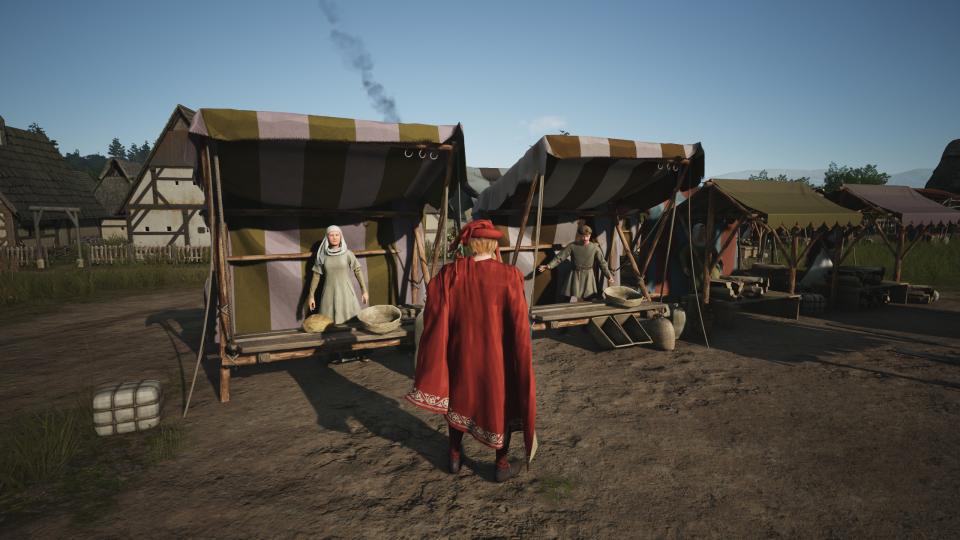

Manor Lords feels quite polished in terms of early access connections, and the only issue I’ve encountered so far is that some houses in my second village were razed by bandits. I couldn’t rebuild them, and when I demolished the empty lots, they turned into “temporary” warehouses that were in fact permanent and impossible to move. The villagers, meanwhile, refused to move into the vacant houses I had generously built for them, choosing instead to freeze to death when winter arrived. My farmers are hard workers, but not too smart.
While the current build is missing many upgrades and policies that will help you fine-tune your medieval society, I’ve still been extremely busy these past few days, and I have a lot more to discover before I build up enough courage to declare war on my rival . I’m sure my villagers can’t wait for more bodies.
Anyway, harvest season is coming, so I better get back to it. But you know what? Before I start, I might make myself a tasty omelet.